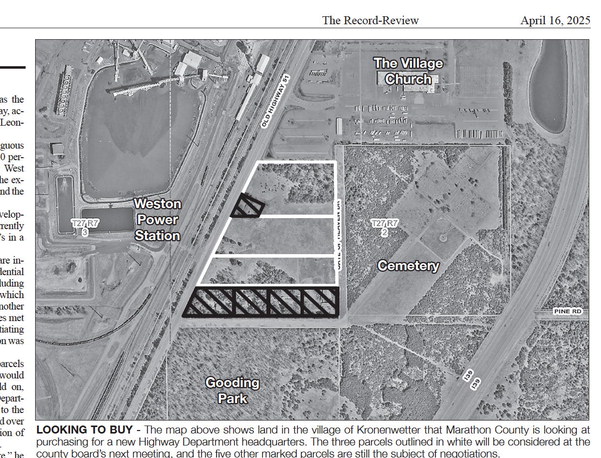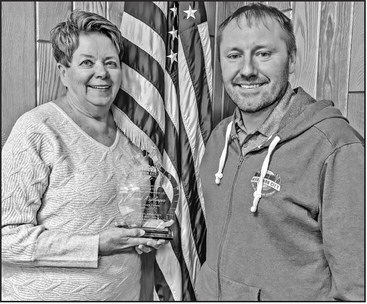$8M loan OK’d for Bug Tussel
By Kevin O’Brien
Marathon County supervisors approved an $8 million loan to Bug Tussel on Tuesday, enabling the company to finish installing nearly 200 miles of fiber optic cable and 18 towers around the county as part of a multi-year effort to expand broadband internet in the county’s rural areas.
With a vote of 28-5, the county board cleared the two-thirds threshold required to approve the loan, with repayment slated to start in 2026.
Under the terms of the agreement, the county will use $8 million in reserve funds to issue a loan to Bug Tussel so it can finish work on the countywide fiber loop and a separate project in the Kronenwetter area known as Leathercamp.
Bug Tussel will be required to make interest- only payments for the first five years, followed by a balloon payment after 12 years that will fully settle its debt with the county. The loan itself will be on a 30-year amortization schedule, with an interest rate of 5.4 percent locked in.
The new loan agreement comes after months of negotiations between the county and Bug Tussel, which had previously asked the board to approve $12.5 million in conduit bonds. The request did not have the support of three-fourths of supervisors, which is required for conduit bonds to be issued.
In 2021, the county approved $25 million in conduit bonding for Bug Tussel to build the towers and install the fiber optic cable, and in 2022, the board agreed to issue a loan for up to $3 million for the Leathercamp project. After the company ran into cost overruns, it asked the county to issue addi-
LOAN/ Loan
Continued from page 1
tional conduit bonds, which would have increased the total debt by 50 percent.
At Tuesday’s meeting, a couple of supervisors raised concerns about the work not getting done, even with additional money being lent to Bug Tussel.
Supervisor Tom Seubert said he recently read an article saying that the United States had “spent” $41 billion on broadband internet expansion, but “not one person had been hooked up yet.”
“Is this becoming a money pit?” he asked. Supervisor John Robinson, chairman of the county’s broadband task force, said the federal government has allocated over $42 billion for broadband expansion through the Broadband, Equity and Access Deployment (BEAD) program, but none of the money has actually been spent yet.
Robinson said the state’s process for allocating its $1.1 billion share of BEAD money has been “slow and cumbersome,” and he believes none of the projects funded through the program will get started until 2026.
“We are frustrated at how slow that process is,” he said.
In the meantime, however, he said the county can move forward with the projects that have already been started by Bug Tussel. Robinson noted that other internet service providers have abandoned projects in the county due to funding issues, leaving residents without high-speed internet.
“Bug Tussel is not choosing to walk away,” he said. “They want to complete the project.”
Robinson also noted that the county benefits from its relationship with Bug Tussel, which has provided 24 strands of fiber optic cable and access to the company’s towers. This saved the county “hundreds of thousands of dollars” when an emergency services tower went down and the county was able to move its equipment to a Bug Tussel instead of building a new one.
“Our law enforcement is dependent upon that,” he said. “It helps our public safety because we’re putting our equipment on those (towers).”
When supervisor Jason Wilhelm asked what would happen with the interest collected on the $8 million loan, board chairman Kurt Gibbs confirmed that it would go back into the county’s general fund.
Before the vote was taken, Robinson reminded board members that the loan amount was $4.5 million less than what Bug Tussel originally requested and the payback period had been shortened from 15 to 12 years.
According to the resolution adopted by the board, the fiber loop project will provide direct access to high-speed internet access to over 1,900 residents across the county.
“This will expand opportunities for fixed wireless service to people who live within the range of the towers, as well as access to fiber to the premise for those that are located along the route,” Robinson said.
Other business
■ The board narrowly approved a resolution calling on state lawmakers “to work collaboratively to address the childcare shortage in Wisconsin.” The vote was 16-15 in favor of the resolution, with one abstention.
Supervisor Chris Dickinson said he was concerned about the government getting involved in a problem that it cannot solve. In fact, he said the state has already done a lot to hurt private childcare operations by continually expanding four-year-old kindergarten at public schools. Many kids who used to be enrolled in daycare are now in school, which has made it harder for childcare providers to make money, he said.
Dickinson, president of the Stratford School Board, said there’s now a push for the state to cover the entire cost of full-time 4K and also half-time three-year-old kindergarten. He said this will result in even fewer kids enrolled in childcare operations.
“It’s going to be much more difficult for those entities to actually make a profit and take care of children,” he said. “So, the government in essence helped create the problem and now we’re asking the state government to help solve the problem. It’s simply a problem they cannot solve.”
Supervisor Stacey Morache, chair of the committee that brought the resolution forward, said she appreciated Dickinson’s comments, but she believes the state needs to do something so people can afford to send their children to daycare and enter the workforce.
“Here’s the reality: We have an economic development crisis in this county,” she said. “We have many people who want to go to work but they can’t.”
■ The board voted 17-15 to sell countyowned property at 405 S. Eighth Ave. in Wausau to the city for $60,000, on the condition that the former parking lot be redeveloped into an apartment building within 36 months of the sale. The appraised value of the property is $99,000, but the Wausau Community Development Authority is investing about $40,000 worth of staff time to redevelop the property, according to Supervisor Robinson.
Supervisor Tim Sondelski objected to selling the property for 40 percent under the appraised value, fearing that it may set a precedent for other entities looking to buy county-owned land.
“I don’t feel it’s a good deal for the taxpayers of the county,” he said.
Dickinson echoed Sondelski’s concerns, saying he would prefer the land be sold on the open market rather than as part of a “special deal” with one particular entity.
Robinson said the sale will help address the need for affordable housing, which is something the county has identified as a priority in the past.
■ The board voted 24-8 to rezone a parcel near the county landfill in the town of Ringle to Heavy Industrial in order to accommodate a renewable gas processing facility that will capture methane from the waste.
Several town of Ringle residents have expressed concerns about the rezoning, fearing that it might open the land up for future industrial development. County officials said the county’s contract with the renewable energy company, Veriti, ensures that only gas processing will take place there.
■ The board adopted a resolution in support of the district attorney’s request for a permanent prosecutor position to be funded through the state’s 2025-2027 biennial budget. A prosecutor was hired last year using the state’s share of American Rescue Plan Act money, but that money will run out.
■ The board accepted a three-year, $300,630 Smart Prosecution grant that will allow the district attorney’s office to hire a limited term employee with the goal of expediting substance-use diversion cases and screening military veterans who enter the criminal justice system.
■ The board approved an increase in medical examiner’s fees, with cost of cremation authorizations and disinterment permits rising from $266.25 to $275. The increased fees are expected to generate an additional $9,400 for the medical examiner’s office.
■ The board accepted a $1 million donation from the B.A. and Esther Greenheck Foundation for the new regional forensic center, which is currently under construction in Wausau.
■ In a related matter, the board approved minor edits to the county’s existing comprehensive plan to align with the newly revised Farmland Preservation Plan adopted earlier this year.
■ The board adopted a resolution calling on state elected officials to work collaboratively to address the shortage of affordable childcare for working families, citing the county’s recent decision to allocate $200,000 in federal funds to train and retain childcare workers.
■ The board approved the creation of a new full-time sheriff’s deputy position for Rib Mountain, with the village covering the full cost of compensation and benefits. This will be the third deputy hired for police protection in the village.
■ The board adopted a resolution in favor of Operation Green Light, which encourages citizens to place a green light in their windows from Nov. 4 to 11 to honor the sacrifices of active duty military members and veterans.




